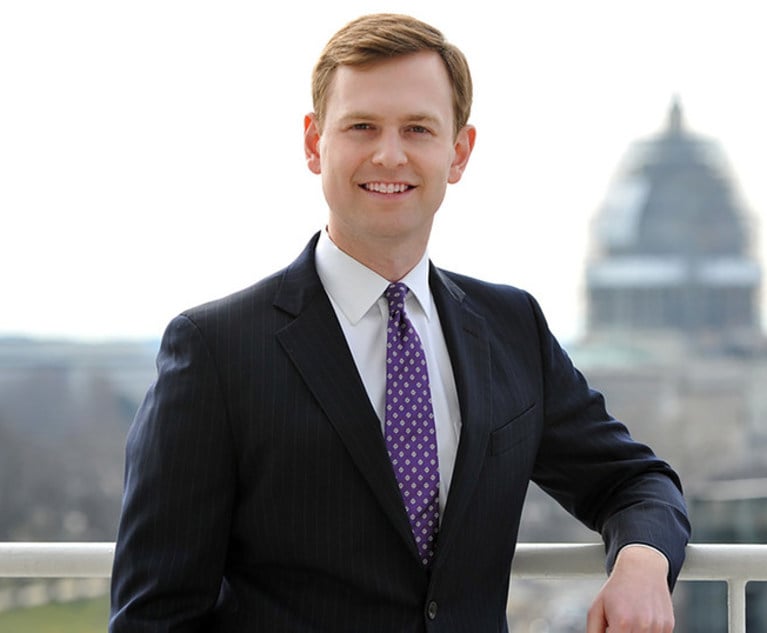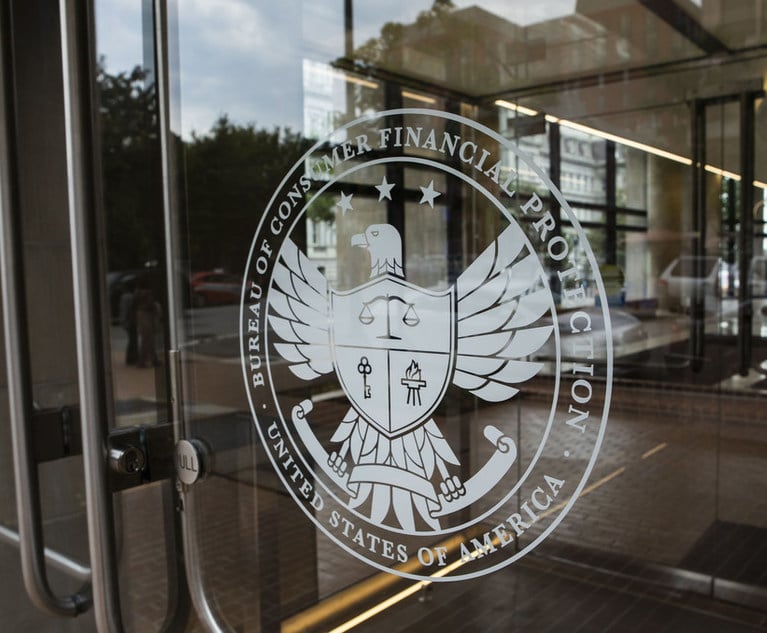Republicans Want to Rename CFPB the 'Consumer Law Enforcement Agency'
Rep. Jeb Hensarling, R-Texas, chairman of the House Financial Services Committee, is proposing to rename the Obama-era Consumer Financial Protection Bureau to the "Consumer Law Enforcement Agency." The proposed change was tucked into a nearly 600-page draft of Hensarling's new Financial Choice Act, which the House Financial Services Committee is set to discuss at a hearing April 26.
April 20, 2017 at 10:00 AM
3 minute read
On the long list of complaints U.S. Rep. Jeb Hensarling, R-Texas, has about the Consumer Financial Protection Bureau, one gripe has risen to the top: The agency's independent, single-director structure.
Last September, Hensarling, chairman of the House Financial Services Committee, proposed transforming the bureau into a five-member body akin to the U.S. Securities and Exchange Commission and Federal Trade Commission. Built into that proposal was a name change for the agency. Hensarling's proposal then: the Consumer Financial Opportunity Commission.
With Donald Trump now occupying the White House, Hensarling on Wednesday rolled out a new proposal to retool the Obama-era CFPB. He proposed a more modest structural change that would keep the single-director setup intact but empower the president to fire the agency's head. If passed in time, the bill would allow Trump to replace the CFPB's director, Richard Cordray, before his five-year term expires in July 2018. Hensarling has called on Trump to “immediately” fire Cordray.
So, no commission after all. What about the agency's name? Hensarling has a solution. In his dream world of a dismantled Dodd-Frank Act, the CFPB would operate as the “Consumer Law Enforcement Agency.”
That name change was tucked into a nearly 600-page “discussion draft” of Hensarling's new Financial Choice Act, which the House Financial Services Committee is set to discuss at a hearing April 26. A representative from the CFPB wasn't immediately reached for comment.
“We want economic opportunity for all, bailouts for none. We want real consumer protections that will give you more choices,” Hensarling said in a prepared statement Wednesday. “Our solution grows the economy from Main Street up, creates more opportunities for working families to get ahead, and levels the playing field with no more Wall Street bailouts.”
The latest proposed name change was among the less weighty provisions in a bill that would restrict the CFPB's enforcement authority and subject it to congressional appropriations. In addition to the word “protection,” the new name would drop “financial,” which conveys a distinction between the CFPB's jurisdiction and the Federal Trade Commission's.
Hensarling's proposal to give the president more oversight of the CFPB director squares with how a federal appeals court—faced with a challenge to the agency's structure—voted to resolve the case. A divided panel of the U.S. Court of Appeals for the D.C. Circuit prescribed that fix in October. The full appeals court later tossed the panel ruling and will rehear the dispute—PHH v. CFPB—next month.
This content has been archived. It is available through our partners, LexisNexis® and Bloomberg Law.
To view this content, please continue to their sites.
Not a Lexis Subscriber?
Subscribe Now
Not a Bloomberg Law Subscriber?
Subscribe Now
NOT FOR REPRINT
© 2025 ALM Global, LLC, All Rights Reserved. Request academic re-use from www.copyright.com. All other uses, submit a request to [email protected]. For more information visit Asset & Logo Licensing.
You Might Like
View All
FTC Finalizes Child Online Privacy Rule Updates, But Ferguson Eyes Further Changes

CFPB Resolves Flurry of Enforcement Actions in Biden's Final Week


'The Tobacco Industry of This Decade': Slew of Class Actions Accuse DraftKings of Creating Addicts
5 minute readTrending Stories
- 1Uber Files RICO Suit Against Plaintiff-Side Firms Alleging Fraudulent Injury Claims
- 2The Law Firm Disrupted: Scrutinizing the Elephant More Than the Mouse
- 3Inherent Diminished Value Damages Unavailable to 3rd-Party Claimants, Court Says
- 4Pa. Defense Firm Sued by Client Over Ex-Eagles Player's $43.5M Med Mal Win
- 5Losses Mount at Morris Manning, but Departing Ex-Chair Stays Bullish About His Old Firm's Future
Who Got The Work
J. Brugh Lower of Gibbons has entered an appearance for industrial equipment supplier Devco Corporation in a pending trademark infringement lawsuit. The suit, accusing the defendant of selling knock-off Graco products, was filed Dec. 18 in New Jersey District Court by Rivkin Radler on behalf of Graco Inc. and Graco Minnesota. The case, assigned to U.S. District Judge Zahid N. Quraishi, is 3:24-cv-11294, Graco Inc. et al v. Devco Corporation.
Who Got The Work
Rebecca Maller-Stein and Kent A. Yalowitz of Arnold & Porter Kaye Scholer have entered their appearances for Hanaco Venture Capital and its executives, Lior Prosor and David Frankel, in a pending securities lawsuit. The action, filed on Dec. 24 in New York Southern District Court by Zell, Aron & Co. on behalf of Goldeneye Advisors, accuses the defendants of negligently and fraudulently managing the plaintiff's $1 million investment. The case, assigned to U.S. District Judge Vernon S. Broderick, is 1:24-cv-09918, Goldeneye Advisors, LLC v. Hanaco Venture Capital, Ltd. et al.
Who Got The Work
Attorneys from A&O Shearman has stepped in as defense counsel for Toronto-Dominion Bank and other defendants in a pending securities class action. The suit, filed Dec. 11 in New York Southern District Court by Bleichmar Fonti & Auld, accuses the defendants of concealing the bank's 'pervasive' deficiencies in regards to its compliance with the Bank Secrecy Act and the quality of its anti-money laundering controls. The case, assigned to U.S. District Judge Arun Subramanian, is 1:24-cv-09445, Gonzalez v. The Toronto-Dominion Bank et al.
Who Got The Work
Crown Castle International, a Pennsylvania company providing shared communications infrastructure, has turned to Luke D. Wolf of Gordon Rees Scully Mansukhani to fend off a pending breach-of-contract lawsuit. The court action, filed Nov. 25 in Michigan Eastern District Court by Hooper Hathaway PC on behalf of The Town Residences LLC, accuses Crown Castle of failing to transfer approximately $30,000 in utility payments from T-Mobile in breach of a roof-top lease and assignment agreement. The case, assigned to U.S. District Judge Susan K. Declercq, is 2:24-cv-13131, The Town Residences LLC v. T-Mobile US, Inc. et al.
Who Got The Work
Wilfred P. Coronato and Daniel M. Schwartz of McCarter & English have stepped in as defense counsel to Electrolux Home Products Inc. in a pending product liability lawsuit. The court action, filed Nov. 26 in New York Eastern District Court by Poulos Lopiccolo PC and Nagel Rice LLP on behalf of David Stern, alleges that the defendant's refrigerators’ drawers and shelving repeatedly break and fall apart within months after purchase. The case, assigned to U.S. District Judge Joan M. Azrack, is 2:24-cv-08204, Stern v. Electrolux Home Products, Inc.
Featured Firms
Law Offices of Gary Martin Hays & Associates, P.C.
(470) 294-1674
Law Offices of Mark E. Salomone
(857) 444-6468
Smith & Hassler
(713) 739-1250








